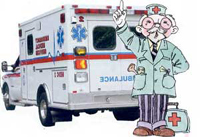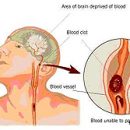Epilepsy attack can be frightened by any person who has especially seen it for the first time. How to provide first help?
Content
First aid for a convulsive attack
It is important to understand that a person does not realize anything during an attack and does not have any pain. The attack lasts a few minutes.
During an attack, it is necessary:
- Keep calm, do not try to forcefully restrain convulsive movements;
- If possible, put a person with an attack on a flat surface and put something soft under his head;
- Do not move a person from the place where the attack happened, if only it is not life-threatening;
- turn the head of the lying patient on the side so as not to wade the tongue, and saliva did not get
 in the respiratory tract, and in cases of vomiting, carefully turn on the side of the whole body;
in the respiratory tract, and in cases of vomiting, carefully turn on the side of the whole body;
- Do not try to squeeze your teeth;
- Do not make artificial respiration or heart massage.
Convulsions will cease in themselves in a few minutes. After the end of the attack you need to give a person the opportunity to calmly come into my senses and, if necessary, sleep. Often, in the completion of the attack, the confusion of consciousness and weakness may occur. Must pass for a while (usually from 5 to 30 minutes), before a person can stand independently.
If the attack continues for more than 5 minutes, the patient has a breath difficult, or he was injured, or this is a pregnant woman, then you need to call a doctor.
Do urgent assistance needed at small attacks (absans)?
Absanx - Sudden and short-term perisage of consciousness. These attacks are usually invisible. They continue for a few seconds. Sometimes it is manifested by rhythmic frequent blink, and a person usually stops moving. During such an attack, no help is required. Just need to stay with the patient until he comes to himself.
Psychomotor attack assistance
Psychomotor attacks are automatic movements of a person with a limited awareness of their actions. Often during these attacks there are violations of perception, obscure bodily sensations, impaired emotional state and fear. After the attack, these actions and sensations may be forgotten.
During a psychomotor attack, it is not necessary to interfere in the actions of the patient, to hold, try to put or calm it. It should only be careful to protect it from potential danger. If there is no risk in the surrounding space to get or put an injury, you can safely watch the walling of the patient, while not talking to him.
After such an attack, a person does not immediately come to himself, so you should not interfere with him, give the medicine immediately, do not cause a doctor. If the attack lasts more than 30 minutes, the second starts after the first, and the patient does not come to a normal state, then you need to contact your doctor. If this for some reason is impossible, I need urgent hospitalization.









